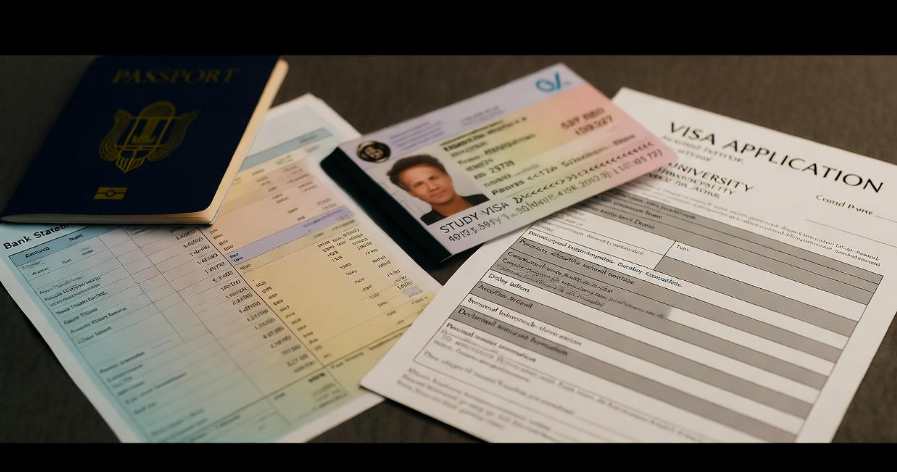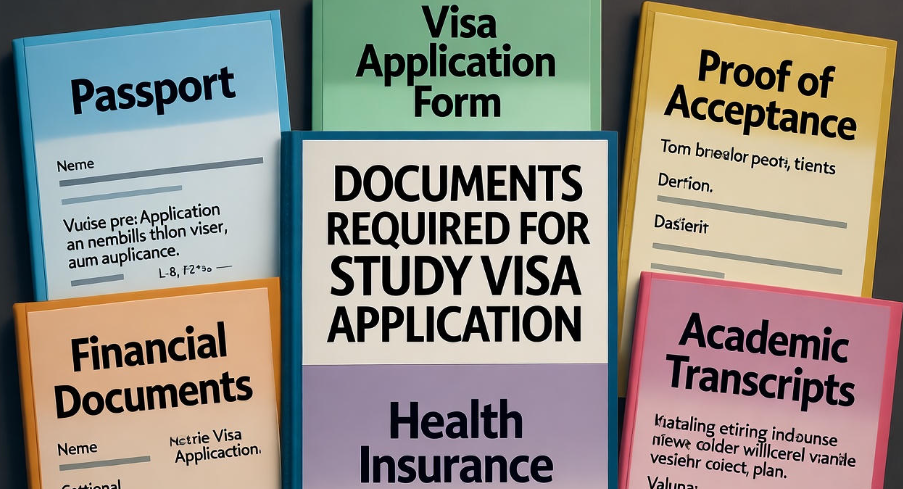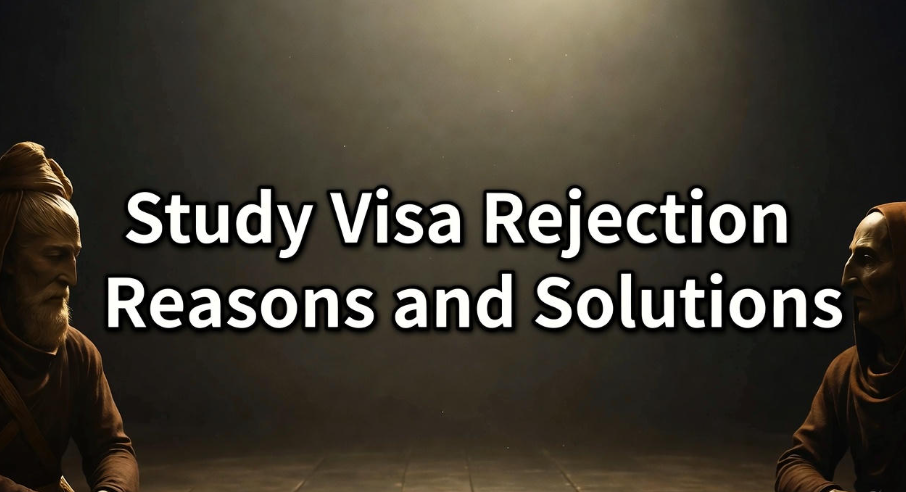Applying for a study visa can be exciting but also a bit confusing when it comes to the paperwork. Every country has its own list of required documents, but most of them ask for similar essentials. If you’re planning to study abroad, having the right documents ready is the first and most important step. This guide explains — in simple human language — exactly what you’ll need and why each document matters.
Passport and Photocopies
Your passport is like your international identity card . Without it, you can’t apply for a visa. Make sure your passport is valid for at least six months beyond your planned stay. Many embassies also require photocopies of the passport pages that show your details and photo.
Sometimes students forget to check their passport’s expiry date — don’t make that mistake! If it’s close to expiring, renew it before applying. A small delay here can cause big trouble later.
| Tip | Description |
|---|---|
| ✅ Check Validity | Passport should be valid for at least 6–12 months after your course ends |
| Copies | Keep 2–3 photocopies of passport pages |
| Photos | Follow embassy photo size (often 35mm x 45mm) |
Visa Application Form
Every study visa starts with this form. It’s usually available on the official embassy or immigration website. Fill it carefully — avoid spelling mistakes or missing fields. If something doesn’t apply to you, write “N/A” instead of leaving it blank.
Pro tip: Always double-check your answers. Once you submit the form, editing is often not allowed. And remember, using clean handwriting or typing clearly shows professionalism. ✍️
Letter of Admission (Offer Letter)
This is proof that a university or college has accepted you. Without it, the visa officer won’t even consider your application. The letter should include your full name, course name, duration, and start date.
Sometimes, the embassy may ask for a “Confirmation of Enrollment” (CoE) instead — especially in countries like Australia. Keep both soft and printed copies.
| Country | Common Term Used |
|---|---|
| USA | I-20 Form |
| UK | CAS (Confirmation of Acceptance for Studies) |
| Canada | Letter of Acceptance (LOA) |
| Australia | CoE |
| Germany | Admission Letter (Zulassungsbescheid) |
Proof of Financial Support
This one is really important . Embassies want to see that you can pay for tuition, living costs, and travel. They don’t want you to struggle financially once you arrive.
You can show financial proof in different ways:
-
Bank statements for the last 3–6 months
-
Scholarship letters
-
Sponsor letters (if someone is paying for you)
-
Fixed deposit certificates
-
Loan approval letters from a recognized bank
If your parents are sponsoring you, attach their income proof and relationship documents too.
| Example of Expenses | Approx. Amount (Varies by Country) |
|---|---|
| Tuition Fees | $10,000 – $30,000 per year |
| Living Expenses | $8,000 – $15,000 per year |
| Travel and Insurance | $2,000 – $3,000 |
| Total Estimated Funds | Around $25,000 – $40,000 |
Academic Documents
Your educational background proves your eligibility for the chosen course. Include:
-
Transcripts of previous studies
-
Certificates (matric, intermediate, bachelor’s, etc.)
-
English test results (IELTS, TOEFL, PTE, etc.)
Embassies want to ensure you’re a genuine student. So, keep all records clean and properly arranged. Put them in chronological order and label them clearly.
Statement of Purpose (SOP)
Think of your SOP as your story — why you want to study abroad and how it connects to your future goals. It’s your chance to speak directly to the visa officer. Write honestly, in your own voice.
Keep it short (around 800–1000 words), and explain:
-
Why you chose that country and course
-
What your career goals are
-
Why you’ll return home after studies
A genuine SOP often makes a big difference in visa approval.
Proof of English Proficiency
Most universities in English-speaking countries require proof that you can understand and communicate in English. That’s where exams like IELTS, TOEFL, or PTE come in.
Submit the official score report with your application. If you studied in an English-medium institution, some embassies may waive this requirement — but it depends on the country.
| Test | Minimum Score Required (General) |
|---|---|
| IELTS | 6.0 – 7.5 overall |
| TOEFL | 80 – 100 iBT |
| PTE | 55 – 65 |
| Duolingo | 100 – 120 (Accepted by some universities) |
Medical Examination Report
Some countries (like Australia, Canada, or New Zealand) ask for a health check-up from a panel physician. This ensures you don’t have any serious medical conditions that might cause issues later.
Keep your vaccination record ready too — some countries require proof of specific vaccines like COVID-19 or Hepatitis.
Police Clearance Certificate (PCC)
A Police Clearance Certificate shows that you don’t have any criminal record. This is usually issued by your local police department or passport office.
Many embassies want to make sure students entering their country have a clean background. If you’ve lived in more than one country for over six months, you might need certificates from each one.
Proof of Accommodation
Visa officers sometimes ask where you’ll stay after arrival — hostel, rented apartment, or with relatives. You can show:
-
University hostel confirmation
-
Rent agreement or hotel booking
-
Invitation letter from a family member (if applicable)
Having accommodation proof shows that you’ve planned everything responsibly.
Visa Fee Payment Receipt
Don’t forget this one! Most embassies require a payment proof of the visa processing fee. Keep the receipt or transaction slip as evidence.
For example:
-
USA – SEVIS + Visa Fee
-
UK – Visa Fee + IHS (Immigration Health Surcharge)
-
Canada – Biometrics + Application Fee
Photographs
Usually, you’ll need 2–4 recent passport-sized photos. Each country has specific photo guidelines (white background, size 35mm x 45mm, neutral expression).
Tip: Always write your name and application number lightly on the back of each photo.
Travel Itinerary or Flight Booking
You don’t always need to buy the ticket before approval, but a tentative booking helps show your travel plans. Just ensure the dates match your course start time.

Insurance Documents
Many countries, especially in Europe, ask for travel or health insurance before granting a visa. It should cover your entire stay. For student visas, some universities include insurance in tuition fees — check before applying.
| Region | Insurance Coverage Required |
|---|---|
| Schengen Countries | Minimum €30,000 coverage |
| Canada | Health Insurance (Varies by Province) |
| Australia | OSHC (Overseas Student Health Cover) |
Interview Preparation Documents
Some embassies conduct interviews after submission. Keep a file ready with:
-
Passport
-
Admission Letter
-
SOP copy
-
Financial documents
-
Any embassy correspondence
Stay calm, confident, and answer naturally. Smiling helps too
-
Want to avoid costly mistakes in your visa journey? Check this out Common Study Visa Mistakes You Should Avoid
Country-Specific Document Requirements (Quick Summary Table)
| Country | Unique Requirements |
|---|---|
| USA | SEVIS Fee Receipt, Form I-20, DS-160 Form |
| UK | CAS Letter, TB Test Report, IHS Payment |
| Canada | GIC Proof (for SDS), Biometrics, LOA |
| Australia | CoE, OSHC, Genuine Temporary Entrant (GTE) Statement |
| Germany | Blocked Bank Account Proof, APS Certificate |
| New Zealand | Health and Character Certificates |
| France | Campus France NOC, Proof of Accommodation |
Small but Important Tips Before You Submit Documents
✅ Always use clear and color scans of documents
✅ Translate non-English papers from authorized translators
✅ Arrange papers in a logical order (passport → academics → finance → others)
✅ Never submit fake or altered documents — it can result in a visa ban
✅ Label each document with your full name and application number
FAQs About Study Visa Documents
Q1: Do I need to submit original documents or copies?
Mostly, certified copies are enough. However, always carry originals for verification if you’re called for an interview.
Q2: How old can my bank statement be?
Usually, it should be from the last 3–6 months. Anything older might not be accepted.
Q3: Can I use my sibling’s or friend’s bank account as financial proof?
Only if they’re your official sponsor and you attach a sponsorship affidavit explaining your relationship.
Q4: Is an IELTS test mandatory for a study visa?
In most English-speaking countries, yes. But some countries accept alternatives or waive it if your previous studies were in English.
Q5: What if I miss one small document?
Even one missing paper can delay or reject your visa. Always double-check with the embassy checklist before submission.
Final Thoughts
Gathering documents for a study visa might feel like a lot of work, but it’s all about preparation. The better organized your papers are, the smoother your visa process will be. Think of it as building a strong foundation for your dream journey abroad.
Always keep both soft and printed copies in a folder, and never rely on memory alone — use checklists. Stay calm, follow instructions carefully, and you’ll be ready to step into your new academic adventure with confidence! ✨




